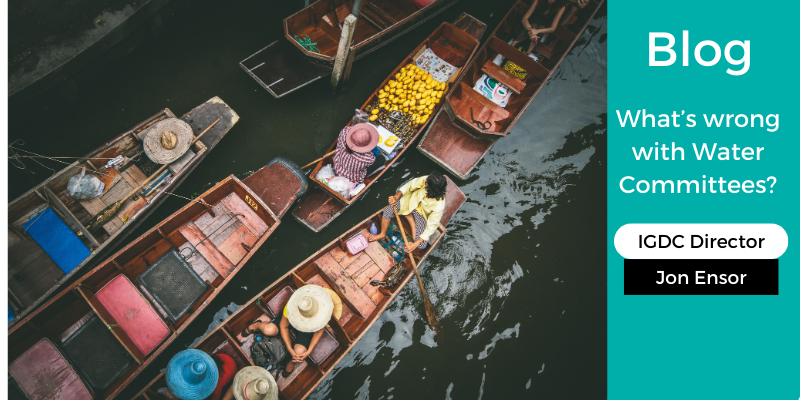What’s wrong with water committees?
IGDC Director, Jon Ensor, and his co-authors Steven Johnson and Daniel Vorbach explore what is wrong with water committees in this blog.

A long-running interdisciplinary collaboration has seen two University of York staff working in the South Pacific island archipelago of Vanuatu since 2015. As an engineer and social scientist, they have been exploring approaches to technology development that are undertaken with and for marginalised communities (they now co-lead the new Equitable Technology Laboratory at York). In Vanuatu, this work focuses on water quality monitoring, which in practice means engaging with village-level water committees.
In Vanuatu, remote villages are distributed on more than 80 islands. It is a geography that does not lend itself to standardised water service provision, and neither private nor public sector water providers supply services to these rural communities. Instead, the responsibility of managing water systems lies with the communities, and for the vast majority in the donor, NGO and policy sectors this means setting up village water committees to ensure sustainable access to safe water.
NGOs, on behalf of the government, have set up or revived water committees to govern and manage repaired or newly established water systems. Yet, as one water sector actor has reported:
“[I’ve] never heard about a water committee that lasted more than five years. Many times they last less than that. Some only last one or two months.”
Despite widespread reporting of the limitations of water committees worldwide, they continue to be rolled out through programmes of training and support. In Vanuatu they remain an important pillar in the government’s framing of how water sector challenges can be resolved.
Water committees in practice
Against this backdrop, community members, Department of Water Resources personnel, and NGO and donor community representatives met at a workshop convened by the University of York in July 2023 to explore the underlying challenges facing water committees, and consider whether they are, in fact, the best option for securing sustainable access to safe water.
The workshop built on findings from research interviews with community members and national level water sector actors, facilitating group discussions between workshop participants with first-hand experience of community water management. Three themes dominated discussions:
- Water challenges. Water is fundamentally a challenging resource to manage. Water sources are often distant (and uphill) from village centres, with routes cutting across land holdings; water quality is variable, and regular extreme weather events and growing populations threaten the sustainability of existing supplies; water tanks and containers are expensive to buy and maintain, requiring community members to contribute through water fees.
- People challenges. Water committees are run by people. Even in settings with strong traditions of communal activities, such as in rural Vanuatu, relying on volunteering does not always work. Often due to poor or ‘one-off’ training, committee members lack clear roles and responsibilities, while many skills, including understanding of policy, financial standards and transparency, are absent or not shared with new members. Effective committees require resourceful people to be present, willing and available, supported by high quality and regular training on key issues and/ or by incentives.
- Governance challenges. Resolving water resource and personnel challenges requires addressing deeper questions of governance, legitimacy and authority. Even dedicated committee members can easily lose interest if community leaders disregard water committee decisions. Effective and sustainable water committees are reported to be more likely when there are other strong community institutions, including strong chiefly governance, and when the water committee is clearly a part of (rather than apart from) these established village structures.
Why water committees?
Discussions emphasised that while the current way that committees are established rarely produces the expected outcomes, community governance and water governance are essential, and need to be supported. However, committees are only one way to govern community activities.
Potential alternative approaches raised during the workshop illustrate this: participants proposed governance arrangements more closely linked with Kastom (traditional knowledge, values, beliefs and practices), run by chiefs rather than committees; a shift to more inclusive committees with a focus on trained individuals; a closer and sustained link between water committees and NGOs; and the establishing of small businesses that are able to provide services across several communities. In all cases, stronger links are required to higher level (area and provincial) governance.
The underlying assumption that committees are needed to govern natural and social resources is widespread among stakeholders at all levels and in many countries across the globe. However, there are a great diversity of local contexts in Vanuatu, and what works in one community may not be appropriate for the next.
Diverse governance arrangements (e.g. village councils, committees, chiefly systems, community meetings) already exist: on the one hand, illustrating the differences between communities, while on the other, identifying the existing forms of governance that can be drawn on and strengthened.
One size does not fit all
While governance through committees may work in some communities, alternatives may be more effective in others. One size does not fit all.
What is required is a shift away from interventions that rely on prescriptive institutional structures, such as water committees, towards facilitated processes that support communities to develop or adapt their own governance arrangements.
This means identifying the challenges that need to be addressed, in context, and developing ideas around how these might be resolved. External interventions can support this by providing this facilitation and supporting local negotiations over which governance arrangements should be implemented.
Rather than defining the particular characteristics of a decision making institution, perhaps the most important step towards sustainable water governance lies in supporting communities to work through alternative approaches and to assemble arrangements that have the skills, legitimacy and authority to address their challenges in context.
Contact us
Interdisciplinary Global Development Centre
igdc@york.ac.uk
01904 323716
Department of Politics and International Relations, University of York, Heslington, York, YO10 5DD, UK
Twitter
Contact us
Interdisciplinary Global Development Centre
igdc@york.ac.uk
01904 323716
Department of Politics and International Relations, University of York, Heslington, York, YO10 5DD, UK
Twitter